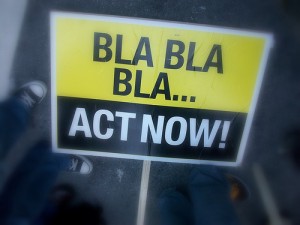From the Letter of James:
Be doers of the word, and not merely hearers who deceive themselves. For if any are hearers of the word and not doers, they are like those who look at themselves in a mirror; for they look at themselves and, on going away, immediately forget what they were like. But those who look into the perfect law, the law of liberty, and persevere, being not hearers who forget but doers who act – they will be blessed in their doing.
(From the Daily Office Lectionary – James 1:22-25 – September 23, 2012)
 It is said that Martin Luther hated the Letter of James; he called it an “epistle of straw” and didn’t believe it should be in the Bible. Why? Some folks will tell you it is because this epistle doesn’t support Luther’s theology of justification by grace through faith; James insists that works are necessary and the reformer just didn’t like that. However, that’s not really the case. Luther had doubts about the epistle’s apostolicity; he didn’t think it was really written by James the Apostle. He was probably right.
It is said that Martin Luther hated the Letter of James; he called it an “epistle of straw” and didn’t believe it should be in the Bible. Why? Some folks will tell you it is because this epistle doesn’t support Luther’s theology of justification by grace through faith; James insists that works are necessary and the reformer just didn’t like that. However, that’s not really the case. Luther had doubts about the epistle’s apostolicity; he didn’t think it was really written by James the Apostle. He was probably right.
Nonetheless, in his preface to the New Testament, Luther praised the Letter of James and said he considered it a good book “because it sets up no doctrine of men but vigorously promulgates the law of God.” According to Luther’s biographer, Roland Bainton, “Once Luther remarked that he would give his doctor’s beret to anyone who could reconcile James and Paul. Yet he did not venture to reject James from the canon of Scripture, and on occasion earned his own beret by effecting reconciliation. ‘Faith,’ he wrote, ‘is a living, restless thing. It cannot be inoperative. We are not saved by works; but if there be no works, there must be something amiss with faith.’ ” (Here I Stand: A Life of Martin Luther)
Earlier this year, President Barack Obama addressed a prayer breakfast and took this passage as his text. Among other things, this is what he said:
The Bible teaches us to “be doers of the word and not merely hearers.” We’re required to have a living, breathing, active faith in our own lives. And each of us is called on to give something of ourselves for the betterment of others – and to live the truth of our faith not just with words, but with deeds.
So even as we join the great debates of our age – how we best put people back to work, how we ensure opportunity for every child, the role of government in protecting this extraordinary planet that God has made for us, how we lessen the occasions of war – even as we debate these great issues, we must be reminded of the difference that we can make each day in our small interactions, in our personal lives.
As a loving husband, or a supportive parent, or a good neighbor, or a helpful colleague – in each of these roles, we help bring His kingdom to Earth. And as important as government policy may be in shaping our world, we are reminded that it’s the cumulative acts of kindness and courage and charity and love, it’s the respect we show each other and the generosity that we share with each other that in our everyday lives will somehow sustain us during these challenging times.
That’s pretty good Christian theology, Mr. President!
====================
Father Funston is the rector of St. Paul’s Episcopal Church, Medina, Ohio.



Leave a Reply